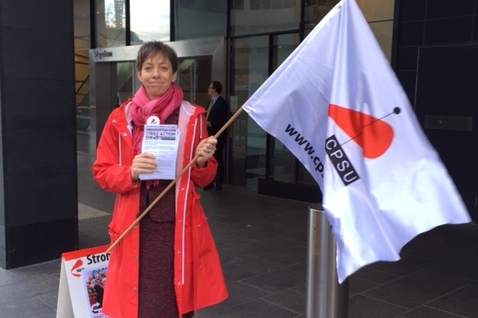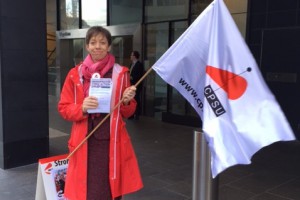
A national wave of strike action by around 36,000 unionised members of the Australian Public Service has rocked federal government agencies in capital cities and regional centres across the nation after the Community and Public Sector Union came good on its promise to deliver workplace stoppages over a deadlocked and bitter year-long enterprise bargaining dispute.
The coordinated national wave of walkouts is set to last for a week from Thursday and comes as the CPSU starts to flex its substantial industrial muscle in a landmark battle to force the Abbott government to back-off from its attempt to strip out a raft of public service entitlements and conditions currently enshrined in agency industrial agreements.
The dogged defence of public service rights and conditions in agency enterprise agreements has become the front-and-centre call to arms by the CPSU as the union movement braces for what it anticipates will be another attempt to push through a ‘Work Choices’ style package of industrial reforms should the Abbott government secure a second term.
The push to preserve conditions has also effectively taken tactical precedence over holding out for a big wage rise as Australia’s stubbornly meagre inflation rate takes the sting of claims for meaningful pay hikes, despite state public services like New South Wales signing off on service-wide annual increase of 2.5 per cent.
Federal public sector employees have been offered between nest to nothing and 1.5 per cent.
For many public servants, the strikes are the first time they have seen or participated in major industrial action after years of relative calm.
“This is the largest industrial action taken by Commonwealth public servants in a generation. Public sector workers don’t take industrial action lightly, but right now they have no other choice,” CPSU National Secretary Nadine Flood said.
“The Abbott Government has slashed 17,300 public sector jobs since taking office and now it’s going after the conditions, rights and take-home wages of 160,000 Australians who work in the public sector.”
And, at a time when wider union membership is abating, the CPSU has managed to attract a substantial number of new card carriers; not exactly part of the Abbott government’s wider plan to make unions irrelevant.
Ironically, the impact of the massive jobs has also weakened the government’s hand in the bargaining process because all parties now know any further meaningful cuts would impede the day to day functioning of the public service and leave the implementation of the Abbott government’s policy agenda more hamstrung than it already is.
With business and consumer confidence still badly subdued, the CPSU is more than happy to paint the Coalition’s goals for public service pay and conditions as a highly ideological and pragmatically flawed experiment that would never fly in the commercial world.
“No major private sector employer is trying to force such draconian terms on its workforce. The Abbott Government’s approach to bargaining is a million miles away from the modern, professional workplace relations most Australians would expect,” Ms Flood said.
“Customs officers could lose up to $8,000 a year from their take-home pay because allowances are being slashed while part-timers and casuals in Centrelink and Medicare would get less money for doing the same work.”
“After more than a year, the Abbott Government is still refusing to sit down with the union, like most other sensible employers do, and negotiate a fair agreement.”
A known frustration with the government’s approach to bargaining within the ranks of senior bureaucrats and some ministers is that the decision to return to an older style of adversarial industrial negotiation will squander four years of sorely needed productivity reforms and innovation that would make government more affordable in the medium term.
They include the automation of many back office functions, like records management, payroll, and human resources and procurement which in the private sector – and some states have largely been standardised on more modern technology platforms greatly reducing maintenance and running costs.
In New South Wales the Baird government has invested heavily in replacing silo-style legacy systems with new interoperable platforms that not only give agencies a more agile policy response capability, but have allowed staff on dead-end system maintenance duties — like manually converting or re-entering information from one file format to another — to be transferred into more meaningful roles.
“Thousands of public sector workers face a cut in their current take home pay, with reduced allowances, cuts to rights and penalty rates plus increased hours, all of which will cost them far more than a 1.5 per cent pay offer would deliver,” Ms Flood said.
“Australia’s public sector workers are not asking for special treatment, they just want the opportunity to negotiate fair agreements that won’t leave them worse off.”
Comment below to have your say on this story.
If you have a news story or tip-off, get in touch at editorial@governmentnews.com.au.
Sign up to the Government News newsletter




The toothless Community and Public Sector Union are lucky to have you as a sympathiser. From my perspective, all their industrial action has been a damp squib so far. In this post-Union age, the CPSU are like the Australian Democrats and the Democratic Labour Party – they had a role in the past, they’re still around, but become increasingly irrelevant with each passing year.
Inspired a reaction from you though. If the CPSU doesn’t make a difference, why are you so vitriolic and hate-filled?
All power to the CPSU. These draconian actions reduce our governments capabilities. Why??? So they can then force privatisation of so many facets – to their friends of course!
Keep fighting the good fight!
“In this post-Union age”? What planet are you living on Elgius. The CPSU has had over 12,000 people join its ranks in last 12 months. Post Union age? Dream on.
In unity !!!
one person doesn’t make much noice, Thousands make a deaffening roar you have to pay attention to !!!